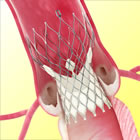This trial will look at safety and effectiveness of this device in patients at high or extreme risk for open-heart surgery.
The CoreValve Evolut R builds on the successful design of the original CoreValve, a device which has been implanted in over 65,000 patients worldwide. Two major enhancements made to the system are the smaller catheter shaft size, reduced more than 20% from 18F to 14F, and the capability to reposition and even recapture the valve, if the initial placement was not optimal.
The primary endpoints of this new study are all-cause mortality and stroke at 30 days and device success rate at 24 hours to seven days. Secondary endpoints include recapture success rate, when attempted, and hemodynamic performance.
This morning's press release from Medtronic, Inc. follows:
Medtronic Announces First U.S. Implants in Clinical Study of Recapturable CoreValve Evolut R
First Patients Successfully Treated in Study to Evaluate Next Generation Transcatheter Valve
September 10, 2014 -- Minneapolis -- Medtronic, Inc. (NYSE: MDT) today announced the first U.S. implants in the CoreValve Evolut R Clinical Study, which will evaluate the safety and effectiveness of the new Medtronic CoreValve®Evolut™ R System. This novel investigational self-expanding valve and 14FR equivalent delivery system offer new capabilities that are designed to advance deliverability and valve performance while providing the option to recapture and reposition the CoreValve Evolut R valve during deployment, if needed, while performing transcatheter aortic valve replacement (TAVR).

Dr. Mathew Williams |
"In clinical trials and real-world use, patients treated with the current CoreValve System have experienced high rates of survival, low rates of stroke and improved quality of life. This study will build on that strong legacy by evaluating the next generation of this successful system, a recapture-enabled valve with the lowest-profile delivery system," said Mathew Williams, co-primary investigator for the study, and chief of Adult Cardiac Surgery and director of Interventional Cardiology and Structural Heart at NYU Langone Medical Center in New York City.
The prospective CoreValve Evolut R Clinical Study will enroll up to 250 patients with severe symptomatic aortic stenosis who are considered at high or extreme risk for open-heart surgical aortic valve replacement, at up to 25 U.S. sites. The primary endpoints are all-cause mortality and disabling stroke at 30 days, as well as device success rate at 24 hours to seven days. Secondary endpoints include recapture success rate, when attempted, and hemodynamic (blood flow) performance.
The new system consists of the CoreValve Evolut R transcatheter valve and the EnVeo™ R Delivery System. The new valve is anatomically designed to increase conformability at the annulus for optimal annular fit and sealing, while maintaining supra-annular valve position for improved blood flow and hemodynamic performance. The EnVeo R delivery system offers a new InLine Sheath which significantly reduces the profile of the catheter shaft to 14F equivalent (less than 1/5 inch). The EnVeo system's 1:1 delivery response is designed to provide first-time valve placement accuracy during deployment. The new system builds on experience from more than 65,000 CoreValve System implants worldwide.

Dr. Jeffrey J. Popma |
"The Evolut R System is designed to provide physicians with greater confidence throughout the procedure, and a back-up plan in case the valve isn't positioned correctly at first," said Jeffrey J. Popma, M.D., director of Interventional Cardiology at the Beth Israel Deaconess Medical Center and professor of medicine at Harvard Medical School, Boston, who served as national co-principal investigator of the original CoreValve U.S. Pivotal Trial. "While the delivery system is designed to enable accurate positioning on the first attempt, the added assurance of recapturability to a commercially proven valve will be a significant advance for TAVR therapy."
The CoreValve Evolut R transcatheter valve system received CE (Conformité Européene) Mark earlier this month. In the U.S., the CoreValve Evolut R System is limited to investigational use only.
Aortic stenosis is a condition where the aortic valve narrows, thereby limiting blood flow from the aorta to the rest of the body. Untreated, aortic valve stenosis can lead to serious heart problems including heart failure and even death.
In collaboration with leading clinicians, researchers and scientists worldwide, Medtronic offers the broadest range of innovative medical technology for the interventional and surgical treatment of cardiovascular disease and cardiac arrhythmias. The company strives to offer products and services that deliver clinical and economic value to healthcare consumers and providers around the world.
About Medtronic
Medtronic, Inc. (www.medtronic.com), headquartered in Minneapolis, is the global leader in medical technology - alleviating pain, restoring health and extending life for millions of people around the world.
Any forward-looking statements are subject to risks and uncertainties such as those described in Medtronic's periodic reports on file with the Securities and Exchange Commission. Actual results may differ materially from anticipated results.



